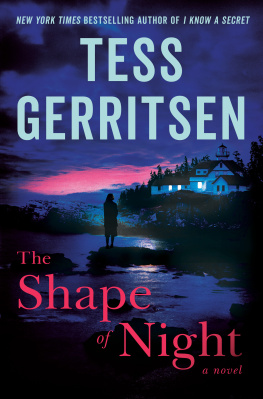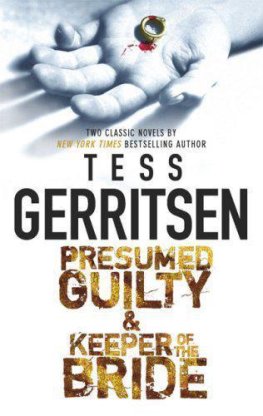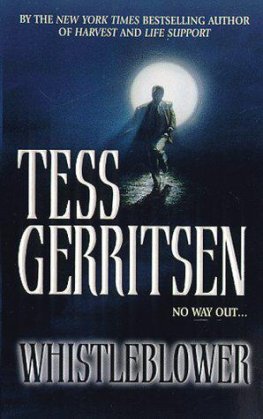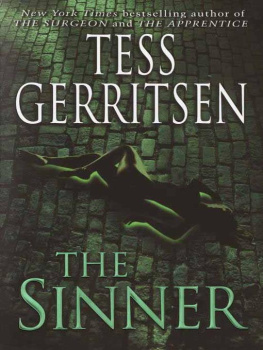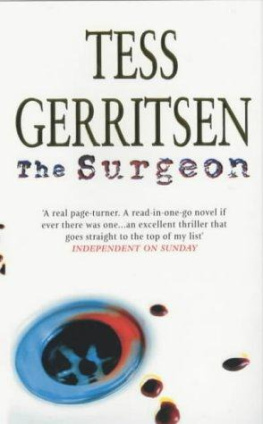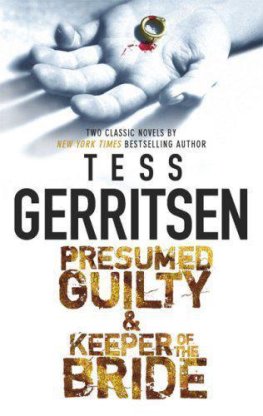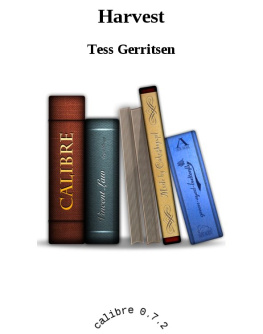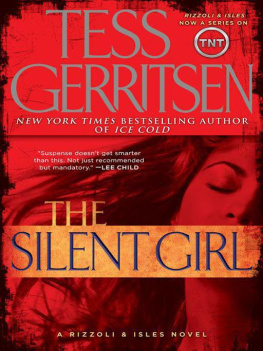Tess Gerritsen - The Keepsake
Here you can read online Tess Gerritsen - The Keepsake full text of the book (entire story) in english for free. Download pdf and epub, get meaning, cover and reviews about this ebook. year: 2008, publisher: Ballantine Books, genre: Detective and thriller. Description of the work, (preface) as well as reviews are available. Best literature library LitArk.com created for fans of good reading and offers a wide selection of genres:
Romance novel
Science fiction
Adventure
Detective
Science
History
Home and family
Prose
Art
Politics
Computer
Non-fiction
Religion
Business
Children
Humor
Choose a favorite category and find really read worthwhile books. Enjoy immersion in the world of imagination, feel the emotions of the characters or learn something new for yourself, make an fascinating discovery.

- Book:The Keepsake
- Author:
- Publisher:Ballantine Books
- Genre:
- Year:2008
- Rating:4 / 5
- Favourites:Add to favourites
- Your mark:
- 80
- 1
- 2
- 3
- 4
- 5
The Keepsake: summary, description and annotation
We offer to read an annotation, description, summary or preface (depends on what the author of the book "The Keepsake" wrote himself). If you haven't found the necessary information about the book — write in the comments, we will try to find it.
The Keepsake — read online for free the complete book (whole text) full work
Below is the text of the book, divided by pages. System saving the place of the last page read, allows you to conveniently read the book "The Keepsake" online for free, without having to search again every time where you left off. Put a bookmark, and you can go to the page where you finished reading at any time.
Font size:
Interval:
Bookmark:
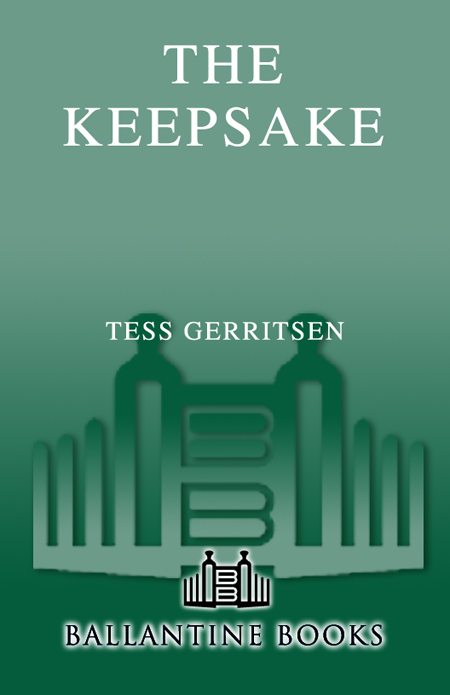
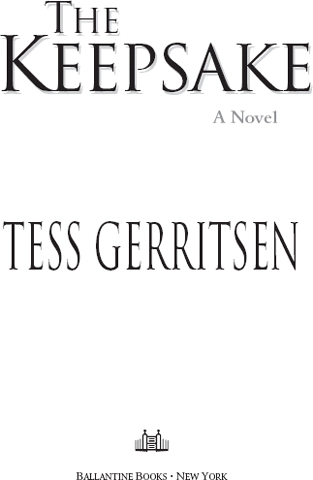
CONTENTS
To Adam and Joshua,
for whom the sun doth shine
Every mummy is an exploration, an undiscovered continent that youre visiting for the very first time.
DR. JONATHAN ELIAS, Egyptologist
ONE
He is coming for me.
I feel it in my bones. I sniff it in the air, as recognizable as the scent of hot sand and savory spices and the sweat of a hundred men toiling in the sun. These are the smells of Egypts western desert, and they are still vivid to me, although that country is nearly half a globe away from the dark bedroom where I now lie. Fifteen years have passed since I walked that desert, but when I close my eyes, in an instant I am there again, standing at the edge of the tent camp, looking toward the Libyan border, and the sunset. The wind moaned like a woman when it swept down the wadi. I still hear the thuds of pickaxes and the scrape of shovels, can picture the army of Egyptian diggers, busy as ants as they swarmed the excavation site, hauling their gufa baskets filled with soil. It seemed to me then, when I stood in that desert fifteen years ago, as if I were an actress in a film about someone elses adventure. Not mine. Certainly it was not an adventure that a quiet girl from Indio, California, ever expected to live.
The lights of a passing car glimmer through my closed eyelids. When I open my eyes, Egypt vanishes. No longer am I standing in the desert gazing at a sky smeared by sunset the color of bruises. Instead I am once again half a world away, lying in my dark San Diego bedroom.
I climb out of bed and walk barefoot to the window to look out at the street. It is a tired neighborhood of stucco tract homes built in the 1950s, before the American dream meant mini mansions and three-car garages. There is honesty in the modest but sturdy houses, built not to impress but to shelter, and I feel safely anonymous here. Just another single mother struggling to raise a recalcitrant teenage daughter.
Peeking through the curtains at the street, I see a dark-colored sedan slow down half a block away. It pulls over to the curb, and the headlights turn off. I watch, waiting for the driver to step out, but no one does. For a long time the driver sits there. Perhaps hes listening to the radio, or maybe hes had a fight with his wife and is afraid to face her. Perhaps there are lovers in that car with nowhere else to go. I can formulate so many explanations, none of them alarming, yet my skin is prickling with hot dread.
A moment later the sedans taillights come back on, and the car pulls away and continues down the street.
Even after it vanishes around the corner, I am still jittery, clutching the curtains in my damp hand. I return to bed and lie sweating on top of the covers, but I cannot sleep. Although its a warm July night, I keep my bedroom window latched, and insist that my daughter, Tari, keeps hers latched as well. But Tari does not always listen to me.
Every day, she listens to me less.
I close my eyes and, as always, the visions of Egypt come back. Its always to Egypt that my thoughts return. Even before I stood on its soil, Id dreamed about it. At six years old, I spotted a photograph of the Valley of the Kings on the cover of National Geographic, feeling instant recognition, as though I were looking at a familiar, much-beloved face that I had almost forgotten. That was what the land meant to me, a beloved face I longed to see again.
And as the years progressed, I laid the foundations for my return. I worked and studied. A full scholarship brought me to Stanford, and to the attention of a professor who enthusiastically recommended me for a summer job at an excavation in Egypts western desert.
In June, at the end of my junior year, I boarded a flight to Cairo.
Even now, in the darkness of my California bedroom, I remember how my eyes ached from the sunlight glaring on white-hot sand. I smell the sunscreen on my skin and feel the sting of the wind peppering my face with desert grit. These memories make me happy. With a trowel in my hand and the sun on my shoulders, this was the culmination of a young girls dreams.
How quickly dreams become nightmares. Id boarded the plane to Cairo as a happy college student. Three months later, I returned home a changed woman.
I did not come back from the desert alone. A monster followed me.
In the dark, my eyelids spring open. Was that a footfall? A door creaking open? I lie on damp sheets, heart battering itself against my chest. I am afraid to get out of bed, and afraid not to.
Something is not right in this house.
After years of hiding, I know better than to ignore the warning whispers in my head. Those urgent whispers are the only reason I am still alive. Ive learned to pay heed to every anomaly, every tremor of disquiet. I notice unfamiliar cars driving up my street. I snap to attention if a co-worker mentions that someone was asking about me. I make elaborate escape plans long before I ever need them. My next move is already planned out. In two hours, my daughter and I can be over the border and in Mexico with new identities. Our passports, with new names, are already tucked away in my suitcase.
We should have left by now. We should not have waited this long.
But how do you convince a fourteen-year-old girl to move away from her friends? Tari is the problem; she does not understand the danger were in.
I pull open the nightstand drawer and take out the gun. It is not legally registered, and it makes me nervous, keeping a firearm under the same roof with my daughter. But after six weekends at the shooting range, I know how to use it.
My bare feet are silent as I step out of my room and move down the hall, past my daughters closed door. I conduct the same inspection that I have made a thousand times before, always in the dark. Like any prey, I feel safest in the dark.
In the kitchen, I check the windows and the door. In the living room, I do the same. Everything is secure. I come back up the hall and pause outside my daughters bedroom. Tari has become fanatical about her privacy, but there is no lock on her door, and I will never allow there to be one. I need to be able to look in, to confirm that she is safe.
The door gives a loud squeak as I open it, but it wont wake her. As with most teenagers, her sleep is akin to a coma. The first thing I notice is the breeze, and I give a sigh. Once again, Tari has ignored my wishes and left her window wide open, as she has so many times before.
It feels like sacrilege, bringing the gun into my daughters bedroom, but I need to close that window. I step inside and pause beside the bed, watching her sleep, listening to the steady rhythm of her breathing. I remember the first time I laid eyes on her, red-faced and crying in the obstetricians hands. I had been in labor eighteen hours, and was so exhausted I could barely lift my head from the pillow. But after one glimpse of my baby, I would have risen from bed and fought a legion of attackers to protect her. That was the moment I knew what her name would be. I thought of the words carved into the great temple at Abu Simbel, words chosen by Ramses the Great to proclaim his love for his wife.
NEFERTARI, FOR WHOM THE SUN DOTH SHINE
My daughter, Nefertari, is the one and only treasure that I brought back with me from Egypt. And I am terrified of losing her.
Tari is so much like me. Its as if I am watching myself sleeping. When she was ten years old, she could already read hieroglyphs. At twelve, she could recite all the dynasties down to the Ptolemys. She spends her weekends haunting the Museum of Man. She is a clone of me in every way, and as the years pass there is no obvious trace of her father in her face or her voice or, most important of all, her soul. She is my daughter, mine alone, untainted by the evil that fathered her.
Next pageFont size:
Interval:
Bookmark:
Similar books «The Keepsake»
Look at similar books to The Keepsake. We have selected literature similar in name and meaning in the hope of providing readers with more options to find new, interesting, not yet read works.
Discussion, reviews of the book The Keepsake and just readers' own opinions. Leave your comments, write what you think about the work, its meaning or the main characters. Specify what exactly you liked and what you didn't like, and why you think so.

